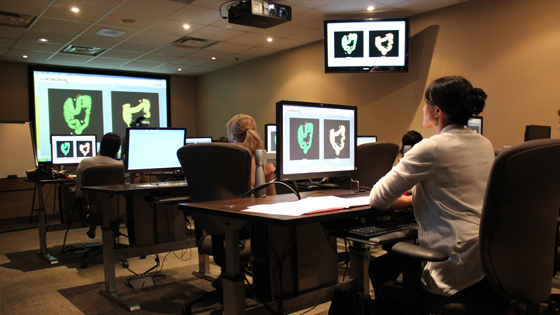
Dr. D'Arcy Little, Chief of Diagnostic Imaging for Orillia Soldiers' Memorial Hospital. (Photo: UHN)
Dr. D'Arcy Little, Chief of Diagnostic Imaging at Orillia Soldiers' Memorial Hospital (OSMH), completed the CT Virtual Colonography course offered at the University of Toronto's Advanced Imaging and Education Centre (AIEC). The program, which celebrates its 5th anniversary this month, is housed at the Toronto General Hospital.
Mere months after certification, Dr. Little began putting his learnings to important use, impacting a community in the process.
"I wanted hands-on exposure to advanced imaging practices such as CT Colonography and Cardiac CT and 3D Imaging," said Dr. Little. "The course director, Dr. Tanya Chawla, organizes small group sessions in an interactive computer lab that deals with real patient cases. This was all important criteria for me."
Less than one year after finishing the comprehensive three-day course, Dr. Little implemented his own CT Colonography Program at his home hospital in Orillia, north of Toronto.
This has led to significant benefits for the patients of Orillia and surrounding communities. The practice performs approximately 50-100 cases per year, and Dr. Little foresees continued growth with added resources.
Virtual Colonography
The program is also a well-respected resource for failed colonoscopies and patients at high-risk for a traditional colonoscopy, and obtains referrals from other hospitals in its Local Health Integration Network (LHIN).
Unlike a traditional colonoscopy, where a fiber-optic camera is inserted into the rectum, CT virtual colonography is a minimally invasive technique using CT scanning to visualize the colon in two and three-dimensional images. This procedure offers a higher level of comfort and safety for patients and requires no sedation or anaesthesia.
"Through this program we are now able to examine the whole colon, which can be challenging and isn't always possible with regular colonoscopies," said Dr. Little. "Virtual colonography offers a better rate at navigating around the entire colon while being less invasive."
It also offers another approach to patients with a failed colonoscopy – an attempted but incomplete colonoscopy when the full length of the colon is not visualized. This is especially significant when screening for cancer.
"We had a patient who had a failed colonoscopy, who then underwent CT colonography which detected early bowel cancer," said Dr. Little. "This cancer was discovered at an earlier stage, and had the patient not undergone virtual colonography it may not have been caught in time."
Virtual colonography also provides an additional option for patients deemed to be unsuitable for optic colonoscopies such as the elderly, those with underlying health concerns or those who don't want to be sedated or undergo the anaesthetic procedure.
The need for this alternative treatment program was clear. OSMH had no existing virtual colonography program prior to Dr. Little's pursuit. There was also no readily accessible program available to patients or referring physicians in any of the nearby hospitals in Collingwood, Midland, Bracebridge or Huntsville. Dr. Little identified this gap as an opportunity.
"I wanted to develop a resource for the community," said Dr. Little. "Taking the course with the AIEC, I knew I'd learn the necessary advanced imaging techniques that would allow me to start a much needed and comprehensive program for our patients."

Virtual Colonography course at the Advanced Imaging and Education Centre (AIEC). (Photo: UHN)
Partnership with AIEC and JDMI
The University of Toronto's Advanced Imaging and Education Centre (AIEC), in partnership with the Joint Department of Medical Imaging (JDMI), is an established Canadian Centre of Excellence for Education and Training that offers students accredited courses in advanced imaging manipulation and evaluation. As part of the curriculum, students are also taught what it takes to develop an advanced imaging program from scratch.
"We're dedicated to bringing the highest standard of quality education to our students so they can make a difference, whether it be through improving patient management or expanding a clinical service," says Dr. Narinder Paul, Clinical Director for the AIEC. "What Dr. Little has accomplished in Orillia is a direct representation of what the AIEC continually aims to achieve."
Since its inception in 2009, the AIEC has trained over 650 participants from 28 different countries around the world, including radiologists, cardiologists, gastroenterologists, residents, fellows and technologists. Originally offered as a single course in Cardiac CT and 3D Imaging, the AIEC has expanded to include additional courses in Virtual Colonography, Breast Tomosynthesis and Vascular Interventional Radiology.
Courses are accredited via the Office of Continuing Professional Development, Faculty of Medicine, University of Toronto for the Royal College of Physicians and Surgeons of Canada. With well-known faculty, an interactive classroom and cutting edge technology, the AIEC offers the opportunity to learn advanced visualization techniques in a state-of-the-art education environment.
Dr. Little, who attended U of T as a resident and knew the strength of the faculty, completed his training with the AIEC in 2009. The following year, he had the CT Colonography Program up and running at Orillia Soldiers' Memorial Hospital.
What's more, the momentum keeps building. Another hospital in the area is planning to start a similar CT Colonography program and is looking to Dr. Little and his colleagues for guidance and support.
Related Links
